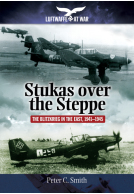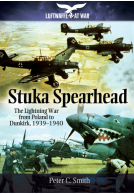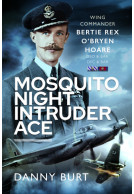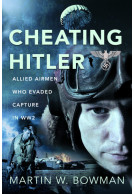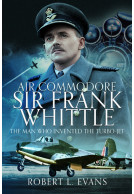The Petlyakov Pe-2 (Hardback)
Stalin's Successful Red Air Force Light Bomber
Imprint: Air World
Pages: 456
Illustrations: 400 black and white illustrations
ISBN: 9781526759306
Published: 23rd March 2020
(click here for international delivery rates)
Order within the next 1 minute to get your order processed the next working day!
Need a currency converter? Check XE.com for live rates
| Other formats available | Price |
|---|---|
| The Petlyakov Pe-2 Paperback Add to Basket | £19.50 |
| The Petlyakov Pe-2 ePub (79.3 MB) Add to Basket | £6.99 |
During the Second World War, the Soviet Union’s Petlyakov Pe-2 Peshka dive-bomber was unique in that it was as fast as most fighter aircraft. This was in a period when it was considered by the RAF that it was impossible for monoplane aircraft to conduct vertical bombing with any degree of success.
During the war the Pe-2 was the principal dive- and light-bomber of Russia’s air power across the vast Eastern Front and it continued in service until the early 1950s with the air forces of the Warsaw Pact countries and Yugoslavia. Conceived by a team of top aircraft designers whom Stalin had incarcerated in a prison camp on trumped-up political charges, the Pe-2 had originally been designed as a high-altitude twin-engine fighter plane, but, due to the outstanding success of the German Stukas in the Blitzkrieg, its role was quickly changed to that of a fast dive-bomber. The Pe-2 arrived in service around the time of the German attack on its hitherto ally.
Although only a handful had reached front line units by the start of Operation Barbarossa in June 1941, the Pe-2 soon became the main dive-bomber in both the Soviet VVS and Naval service. Mass production, by factories hastily moved back beyond the front, meant that numbers increased rapidly, and more than 11,000 of the type, including many variants, were built up to 1945. The Peshka became the mainstay of the Soviet counter-offensive that ultimately resulted in the fall of Berlin. Pe-2s also led the way in the brief but annihilating Manchurian campaign against Japan in the closing days of the war in 1945.
Using official sources, including the official Pe-2 handbook, and numerous colour and black-and-white photographs made available to the author from both official and private sources and collections, this book is the definitive record of the Pe-2 - the dive-bomber supreme!
The Soviet Petlyakov Pe-2 Peshka (or Pawn) was the principal Soviet dive- and light- bomber of the Second World War, and continued in service with Warsaw Pact air forces into the 1950s. Peter Smith has to his credit presented us with a complete history of this famous bomber. in 436 pages, 20 chapters, 6 appendices, a map, diagrams and tables of reference he describes the evolution of the aircraft in Soviet service. The background history is thorough and begins by presenting us with the shortcomings of the Tupolev SB-2. In anticipation of countering high altitude enemy bombers the Pe-2 began as a design for a pressurized high altitude fighter. During pre-war German-Soviet co-operation it was determined that there were no long range bombers planned by the Reichsluftfahrtministerium, so the tasking was changed. Impressed with the accuracy and effectiveness of the Junkers JU-87 in the Spanish Civil War, the Russians' emphasis on producing a dive bomber became paramount.
Gary Wenko, IPMS Magazine 1 2021
Despite having been arrested under on of Stalin's great purges, foremost designer Vladimir Petlyakov was given the project, and in months a complete redesign of the high altitude specification rendered an unpressurized dive bomber with a crew of three. In this form it was faster than most fighters of the time (Such as the Messerchmitt Bf109F). Only a handful of Pe-2s were available at the time of Operation Barbaross, the German invasion of the Soviet Union, so to safeguard supplies, production of the Pe-2 was relocated to Factory 39 in Kazan, Tartarstan. By 1945 over 11,000 of the type had been produced, and the sleek high-speed dive bomber became a legend, successfully operating right across the Eastern Front, and later in Manchuria against the Japanese.
The book goes on to discuss tactics, combat sorties, the female pilots who flew them on combat missions, enemy use (Finland), biographies of many of the aces and foreign service. It's worth mentioning that whilst fighting on a one-thousand mile front some 1500 factories and 10 million workers were relocated behind the Ural Mountains.
"...a deep dive into a niche subject."
Air Power History
The ultimate manual on the Petlyakov Pe-2 light bomber.
Miniaturas JM
Read the full Spanish review here
A ‘must’ for every amateur of the ‘War in the East’ as well as those with an in-depth appreciation of aircraft design and detail.
The Shackleton Association, reviewed by Philip Styles
This is the most comprehensive English language review of the Petlyakov PE-2. Primarily a dive bomber, this successful design was also used in other roles including service as heavy fighter – Highly Recommended
Firetrench
Read the full review here
Peter Smith is well-known for his meticulously researched, comprehensive monologues covering a single aircraft series and its derivatives. The book does not disappoint, covering as it does the development history of the Pe-2 (Peshka), Pe-3 Pe-21 with sub variants and prototypes being fitted neatly into the story. This is not just a dry cataloguing of the aircraft though; the stories of the men and women who flew and fought the Pe-2 feature prominently throughout the book, and a vivid picture emerges of the bureaucratic friction and hazards of taking a largely unskilled workforce to build an advanced light bomber. The Author does not hesitate to highlight the evils of Stalin's Regime or the astounding achievements and blunders that brought the Soviet Union to the verge of collapse, and which helped it survive.
Chris Kemp
The Author makes a convincing case for the Pe-2 having being written out of history by the West at the expense of the Shturmovik (sic) as the Peshka's role as a dive bomber was not well understood, and did not accord with the UK's and USA's light bomber philosophy of the time. Against a background of high attrition as the Soviet Union battled conflicting demands on resources, the aftermath of Stalin's purges and the relocation of factories lock stock and barrel further East, The Peshka went on to become a significant contributor to the Soviet Union's victory in the east.
Chapters include camouflage, the role of women pilots, operational deployment of the Pe-2 and it's use in foreign service. The development of operational and tactical use of the airframe as a reconnaissance, fighter, dive bomber and maritime bomber are covered in depth. Modellers will welcome detailed coverage of the appearance of various marks, including descriptions of the cockpit, down to the colour of markings on controls!
This book claims to be a definitive version of the Pe-2, and I have not yet seen a challenger to the title. Highly recommended for anyone with an interest in the Pe-2 or development of operational air power by the Soviet Union in World War Two.
This is an excellent, comprehensive study of one of the most important Soviet aircraft of the Second World War.
History of War
Read the full review here
Video review featured on Scale Modelling Now
Scale Modelling Now
About Peter C Smith
PETER CHARLES HORSTEAD SMITH was born in Norfolk in 1940. After living in London, Kent and Cambridge he and his wife Pat settled in the small Bedfordshire village of Riseley in 1982 where they currently still reside. Peter is a Member of The Society of Authors, London, and has worked as both a book and a magazine editor but has been a full-time historian and author since 1968. Peter is best known for his eighty-six meticulously researched factual history books on aviation, military and naval topics.Details of all Peter's books are to be found at: www.dive-bombers.co.uk
Fairchild Republic A-10 Thunderbolt II The 'Warthog' Ground Attack Aircraft (Hardback)
The Fairchild-Republic A-10A Close Support aircraft has become a legend over its long front line life. Known as the Warthog due to her unusual appearance, this little aircraft has built up an awesome reputation in the specialised ground-attack role, where her accuracy and deadliness are widely recognised as the best of their kind. Hard lessons from the Second World War, that were reinforced by the bitter experience of the Vietnam War two decades later, showed that it was both impracticable and highly non-cost efficient to use supersonic fighter jets in the close air support mission. A requirement…
By Peter C SmithClick here to buy both titles for £65.00













